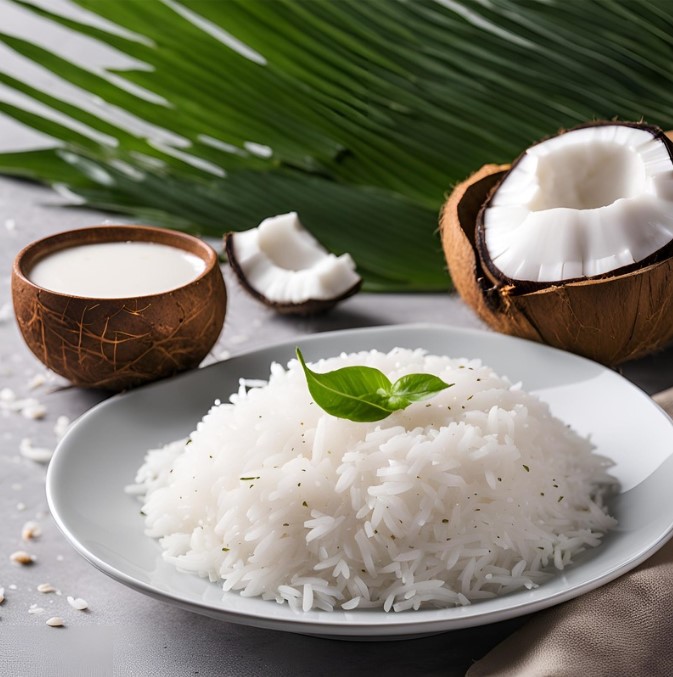

South Indian Coconut Rice, known for its rich and aromatic flavor, is a beloved staple in South Indian cuisine. This vibrant dish, which combines the subtle sweetness of fresh coconut with the aromatic spices typical of South Indian cooking, is both comforting and versatile. Often served as a main course or a side dish, Coconut Rice exemplifies the essence of South Indian culinary traditions, where simplicity meets depth of flavor.
A Taste of Tradition
Coconut Rice is a dish that reflects the abundant use of coconut in South Indian cooking. Coconut is a versatile ingredient that plays a central role in many South Indian recipes, contributing to their distinctive taste and texture. This rice dish is no exception, featuring freshly grated coconut as its star ingredient. The rice is typically cooked with a tempering of spices and garnished with fresh herbs, resulting in a harmonious blend of flavors that is both satisfying and nutritious.
The Heart of the Recipe
The recipe for South Indian Coconut Rice is delightfully simple yet full of character. At its core, it involves cooking rice and then mixing it with a tempering made of mustard seeds, cumin seeds, dried red chilies, curry leaves, and dals (lentils). Freshly grated coconut is then added to the mixture, infusing the rice with a subtle sweetness and a rich, nutty flavor. The result is a dish that is aromatic, flavorful, and incredibly easy to prepare.
Versatility and Variations
One of the great things about Coconut Rice is its versatility. It can be enjoyed on its own or paired with a variety of side dishes such as yogurt, pickle, or vegetable curry. Additionally, regional variations and personal preferences can influence the recipe—some may include additional vegetables or adjust the spice levels according to taste.
Cultural Significance
In South Indian households, Coconut Rice is often made for special occasions, festivals, or as a part of everyday meals. It embodies the flavors of the region and showcases the traditional use of coconut in South Indian cuisine. Whether prepared for a festive gathering or a simple family meal, Coconut Rice is a dish that brings people together with its comforting and flavorful presence.
Wash the rice thoroughly until the water runs clear. Soak it in water for 15-20 minutes, then drain.
In a pot or rice cooker, add the soaked and drained rice with 1 1/2 cups of water (or follow the rice cooker instructions). Add a pinch of salt.
Cook the rice according to the rice cooker's instructions or in a pot on medium heat. If using a pot, bring it to a boil, then reduce the heat to low, cover, and cook for about 15-20 minutes, or until the rice is cooked and the water is absorbed. Let it sit covered for a few minutes after cooking.
Heat oil (or ghee) in a pan over medium heat.
Add mustard seeds and let them splutter.
Add cumin seeds, dried red chilies, curry leaves, and green chilies (if using). Sauté for a minute until fragrant.
Add urad dal and chana dal. Sauté until they turn golden brown.
Add the chopped onions and sauté until they turn translucent.
Add grated ginger and sauté for another minute.
Stir in turmeric powder.
Add the grated fresh coconut (or desiccated coconut) to the pan. Sauté for a couple of minutes until the coconut is slightly golden and fragrant.
Combine:
Gently fluff the cooked rice and add it to the pan with the coconut mixture. Mix well to combine.
Adjust salt if needed. If you like a tangy flavor, you can squeeze in some lemon juice.
Serve:
Garnish with fresh coriander leaves and roasted cashew.
Serve hot with yogurt, pickle, or a side of vegetable curry.
This Coconut Rice is aromatic and packed with flavor, making it a delightful dish for any occasion. Enjoy!
For South Indian Coconut Rice, basmati or sona masuri rice is ideal due to its aromatic qualities and fluffy texture. However, you can use other types of rice like jasmine or long-grain rice if necessary.
Wash the rice under cold water until the water runs clear to remove excess starch. Soak the rice in water for 15-20 minutes, then drain it well before cooking. This helps achieve a non-sticky texture.
While fresh grated coconut is preferred for its authentic flavor and texture, you can use canned coconut milk as a substitute. If using coconut milk, add it to the rice while cooking but be cautious of the liquid quantity; use less water accordingly.
To cook rice perfectly, follow these steps:
Use the correct water-to-rice ratio (typically 1 ½ cups of water for 1 cup of rice).
Bring the water to a boil, then reduce the heat to low and cover.
Cook until the water is absorbed and the rice is tender (about 15-20 minutes).
Let the rice sit covered for a few minutes before fluffing it with a fork to prevent it from becoming mushy.
Tempering spices (also known as "tadka") is a crucial step in South Indian cooking. It involves frying spices in oil or ghee to release their essential oils and enhance their flavors. This process infuses the rice with a deeper, more complex flavor.
To adjust spice levels:
For less heat: Use fewer green chilies and dried red chilies.
For more heat: Increase the quantity of green chilies and dried red chilies.
For milder flavors: Reduce the amount of mustard seeds and cumin seeds.
Yes, you can add vegetables to Coconut Rice. Common additions include peas, carrots, or bell peppers. Chop the vegetables finely and sauté them with the spices before mixing them into the rice.
Store leftover Coconut Rice in an airtight container in the refrigerator for up to 3-4 days. To reheat, you can use a microwave or stovetop. If reheating on the stove, add a little water to prevent the rice from drying out and heat over low heat until warmed through.
Yes, you can prepare Coconut Rice ahead of time. Cook the rice and follow the recipe instructions. Once cooled, store it in an airtight container in the refrigerator. It can be made a day or two in advance and reheated before serving.
Coconut Rice pairs well with various accompaniments such as:
Yogurt: A cooling side that complements the spices.
Pickle: Adds a tangy contrast.
Vegetable curry: Provides a hearty and flavorful pairing.
Papadam or appalam: Adds a crispy texture to the meal.
Enjoy the yum :)